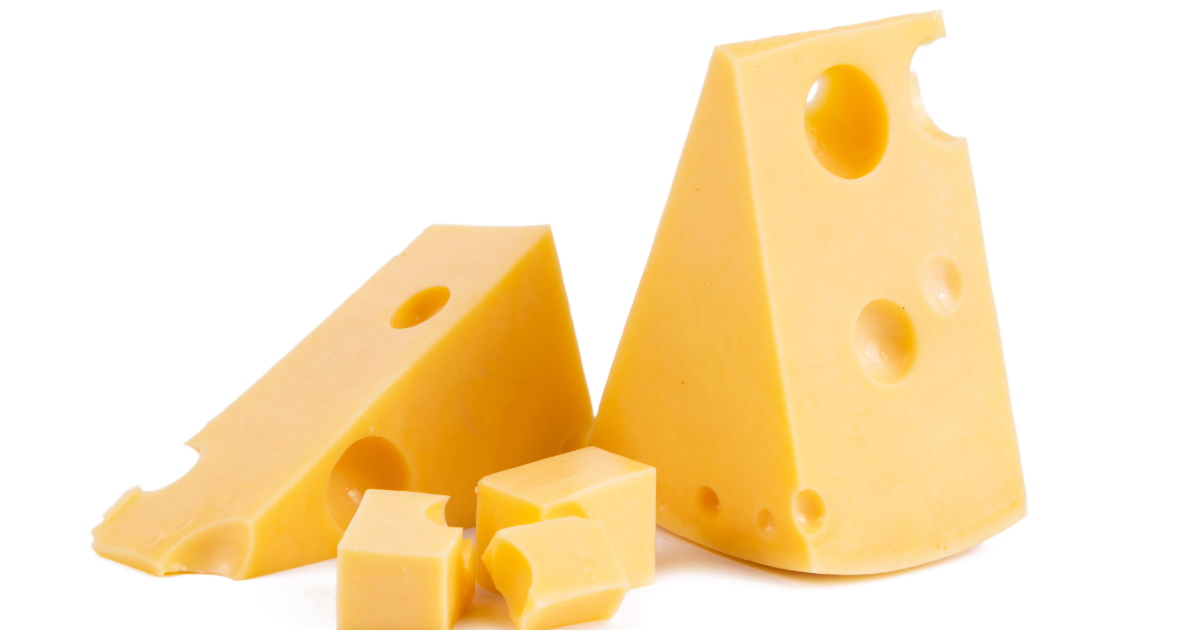Swiss cheese and Gouda cheese are two of the most popular cheeses in the world. Both have unique flavors, textures, and uses that set them apart.

But what exactly are the differences between these two famous cheeses?
Origins and History
Swiss cheese refers to a general category of cheeses originally made in Switzerland. The most famous type of Swiss cheese is Emmental, which dates back to the 1300s in the Emmental valley of Switzerland. Emmental cheese has a savory and sweet nutty flavor, as well as large holes formed by carbon dioxide released during production. Swiss cheese gained international fame during the early 1800s.
On the other hand, Gouda cheese traces its origins to the Dutch city of Gouda in the Netherlands during the Middle Ages. It's made from cow's milk and gets its name from the fact that merchants used to weigh and sell the cheese at the city's markets. Like Swiss cheese, Gouda gained increasing popularity outside the Netherlands starting from the 1800s.
Swiss cheese refers to cheeses from Switzerland, while Gouda cheese hails specifically from the Netherlands. Both have centuries-long histories tied to their geographic region of origin.
Ingredients and Manufacturing Process
Swiss cheese is generally made from raw cow's milk, along with starter cultures and rennet. Bacteria like Propionibacterium are added to form the signature holes, or "eyes". The curds are then pressed into rounds and brined or soaked in salt water, helping form Swiss cheese's firm texture.
Gouda cheese uses pasteurized cow's milk for food safety reasons. Like Swiss cheese, Gouda also relies on starter cultures and rennet to develop texture and flavor. But no gases are injected to create holes. Instead, the smooth, dense curd simply ages over time, intensifying Gouda's taste.
So in short, the ingredients are similar for both cheeses - it's the manufacturing that differs. Swiss cheese actively introduces gases during production to create holes, whereas Gouda omits that step.
Key Takeaway: Swiss cheese uses raw milk and bacteria that make holes, while Gouda uses pasteurized milk and omit gases for a dense texture.
Flavor Profile and Texture
The flavor and texture differ noticeably between Swiss and Gouda cheese.
Swiss cheese tends to have a very mild, slightly sweet and nutty taste. Its smooth, elastic texture results from using intact casein micelles during manufacturing. The signature holes or "eyes" also give Swiss cheese a distinctive appearance.
Gouda cheese starts out mildly sweet and becomes more robust, salty, and savory as it ages. Young Gouda has a creamy, smooth texture, while aged Gouda becomes harder and crunchier, with tasty protein crystals. Regardless of age, Gouda lacks holes and has a consistent pale yellow interior.
Swiss cheese delivers mild sweetness and elastic texture with holes, while Gouda transforms from mildly sweet to rich and salty without holes during aging.
Usages
Thanks to its mild profile, Swiss cheese adapts well to both sweet and savory dishes:
- Sandwiches
- Salads
- Omelets
- Fondue
- Croque monsieur (grilled ham and cheese)
However, Swiss cheese truly shines when highlighted, like when served with fruits or charcuterie on a cheese board.
Comparatively, smooth Gouda works excellently for:
- Grilled cheese sandwiches
- Macaroni and cheese
- Soups
- Sauces
- Pairing with wine or beer
Aged Gouda with crunchy protein bits pairs wonderfully with bold beers and full-bodied red wines that complement its rich savoriness.
Swiss cheese plays a supporting role across dishes, while mild Gouda incorporates smoothly into meals and aged Gouda makes an excellent stand-alone partner for drinks.
Nutrition
Here is a breakdown comparing the nutrition facts of Swiss cheese and Gouda cheese:
| Nutrient (per 100g) | Swiss cheese | Gouda cheese |
|---|---|---|
| Calories | 393 kcal | 356 kcal |
| Fat | 30.99 g | 27.44 g |
| Saturated fat | 18.23 g | 17.61 g |
| Protein | 26.96 g | 24.94 g |
| Carbohydrates | 1.44 g | 2.22 g |
| Calcium | 890 mg | 700 mg |
| Sodium | 187 mg | 819 mg |
Swiss cheese contains more calories, protein, and calcium than Gouda, while Gouda has slightly more carbs and way more sodium.
Both can fit into a balanced diet. But for those limiting sodium or calories, young Gouda proves a bit lighter option than Swiss cheese.
Cost
Swiss cheese tends to cost more than Gouda for two reasons:
- Authentic Swiss cheese like Emmental requires specialized equipment and controlled conditions when aging over 5+ months. That extended production and stringent requirements increase costs.
- As Gouda ages longer, it does grow comparably pricey to Swiss. But young Gouda ripens much quicker, so more affordable versions abound.
Real Swiss cheese like Emmental costs more due to intensive production needs. Young Gouda cheese ripens faster, so budget-friendly versions prevail. But extra-aged Gouda rivals Swiss cheese pricing.
Appearance
You can easily distinguish Swiss and Gouda cheese by sight:
- Swiss cheese: Pale yellow interior with large holes surrounded by shiny, elastic texture. Firm and bendable.
- Gouda cheese: Consistent pale yellow interior without holes. Young Gouda is firm yet creamy, while aged Gouda appears dry and speckled with crunchy protein bits.
Swiss cheese has elastic texture with prominent holes absent in Gouda's consistent color. Aged Gouda also appears drier and speckled compared to shiny Swiss.
Popularity
Swiss cheese enjoys immense popularity, largely thanks to the global fondness for sandwiches and burgers that favor Swiss cheese's melty properties. For instance, Swiss cheese gets commonly stacked in deli sandwiches or melted onto burger patties at restaurants all around the world.
However, as the world's most popular cheese exported globally, Gouda cheese surpasses Swiss cheese in terms of overall consumption. That stems from Gouda cheese adapting well across cultures and cuisines ranging from Mexican dishes to various Asian recipes. Gouda simply incorporates seamlessly into more meals worldwide.
Key Takeaway: Swiss cheese melts appealingly onto burgers and sandwiches but Gouda cheese appears more frequently across global cuisines.
FAQs
Can I substitute Swiss for Gouda (or vice versa) in recipes?
Yes, you can safely swap out Swiss and Gouda in most recipes, thanks to their mild flavors, creamy textures, and meltability. However, the holey appearance of Swiss cheese and crunchy bits in aged Gouda may impact certain dishes more dependent on looks.
What wine pairs best with Swiss cheese vs Gouda?
The mild nuttiness of Swiss cheese matches wonderfully with fruity white wines like Chardonnay or wheat beers. In contrast, aged Gouda's salty savoriness fits beautifully with bold Cabernet Sauvignon or Port wine.
Is one cheese healthier than the other?
Neither proves significantly healthier overall. But Swiss cheese contains more protein and calcium. Young Gouda fits lower calorie and sodium diets better. Nutritionally, both work fine in moderation.
Conclusion
Swiss and Gouda cheese differ noticeably regarding origins, manufacturing, flavor, texture, cost, appearance, and global popularity, though both share mileage as accessible cheeses across cuisines.
Ultimately personal taste preferences dictate which cheese suits your needs best.

